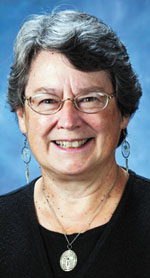By Corrine Winter
As we approach the beginning of another academic year, I am always drawn to reflect on the value of learning and of the Catholic grasp of the relationship between faith and reason. I believe my (then 97-year-old) father expressed it well a couple of years ago when I sent him a new book on the creed and he told me he was so glad that he was part of such a rich tradition that he still had more to learn about it. As Catholics, we are called to believe we always have more to learn — as individuals but also as a community. We are committed to the principle that fidelity to the Tradition means so much more than just remembering and repeating the past.

The Second Vatican Council challenged many Catholics to be true to the principle that fidelity often requires growth and change. Some who had been members of the church found the challenge too great and pulled away, forming new sects or joining others that seemed to provide greater “security” in one form or another.
But by far the largest number have continued within the Catholic community to work together on our common mission to study and live the truth that is fully revealed in Jesus Christ but not yet fully grasped in all its implications for our lives.
Over the past year, Pope Francis has invited us to participate in the search for greater understanding through the work of the extraordinary and ordinary synods of bishops and through the Year of Mercy. These two come together in my reflections as I read the pope’s Apostolic Exhortation, Amoris Laetitia. I find the document inspiring. In it, the pope urges us to remain true to the teachings of the church on the sacredness of life and on the vocation of marriage. At the same time, he insists that we need to find new and more effective ways to bear witness to those teachings.
We must, Pope Francis says, discern ways in which the values we hold as Catholics may be made more attractive to those who struggle to see how they can fit into their own lives. We must accompany with love and understanding those who find themselves in situations such as diverse family structures with personal and economic needs that seem impossible to meet within the ideals set forth by the church.
Above all, we must fight temptations to self-righteousness. We must acknowledge that all of us fail to live perfectly even ideals that we hold most dear. Being constantly aware of our own need for ongoing conversion and for God’s mercy, we will proclaim our beliefs more effectively as God’s saving truth rather than as evidence that we are right while others are wrong.
Pope Francis has also demonstrated his dedication to continuing growth in the church by his recent formation of a committee to study the possibility of ordaining women deacons in the church. He has called for a review of the tradition of women deacons and their role in the early church. Not that the church will simply do again what was done centuries ago in another cultural context, but that we might, in reflecting on and praying about their actions, come to a better understanding of how to express the same faith in our own time and place.
Will there be a change to welcome women deacons? What other changes might take place in a church that has been described by one theologian as “Ever reforming?” We don’t know. We certainly don’t believe in change for the sake of change, or in change without sufficient reflection. But we are not afraid.
Because we, as Catholics, believe that, as Pope St. John Paul II reminded us forcefully in his encyclical Fides et Ratio, faith and reason are not only compatible, but need each other, we ought never fear proposals that call us to grow in our understanding of our faith. Rather, we should welcome opportunities to appreciate the depth of the richness of the mystery of God and the relationship to which God calls us within a community called to grow together in faith.
(Corinne Winter is a professor of theology at St. Ambrose University in Davenport.)











